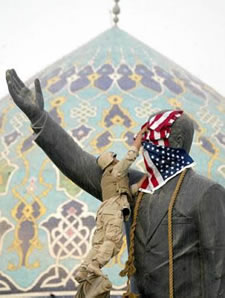 In politics and war, as in love, there are windows of opportunity that need to be taken advantage in a timely manner. Failure to do so mean that opportunity may be lost forever.
In politics and war, as in love, there are windows of opportunity that need to be taken advantage in a timely manner. Failure to do so mean that opportunity may be lost forever.The half hearted efforts by the Bush administration in the wars in Afghanistan and Iraq have been incredibly frustrating to watch. Withdrawal of a portion of American troops fighting in Afghanistan may have been too fast. NATO has had difficulty coming up with soldiers and the Taliban are making a comeback in the country from their safe haven in the territory of our ally, Pakistan. Yesterday Senator Bill Frist went so far as to suggest the Taliban needs to be made a part of the government since they can’t be defeated militarily. (Does the distinguished Senator from Tennessee truly believe the Taliban has any interest in being a partner versus being in absolute control and has he forgotten how they treat women and anyone who does not follow the very strict and backward Taliban party line?)
Iraq followed the same pattern. The first phase of the war was successful although the out-of-control looting should have been a clue of things to come. The formal occupation under Paul Bremner made one bad decision after another. One of the worse decisions was to abolish the Iraqi army but not provide American troops to fill the security vacuum. Then the administration sat back and twiddled their thumbs as the situation deteriorated.
Opportunities were not taken advantage of and are now gone. As long as the situation in both countries remains unresolved the suffering by the respective populations continue and the entire Middle East remains unstable. It is almost as if this administration prefers the continuation of a state of war as opposed to winning the conflicts and ending the hostilities.
Here is an interesting piece in the Wall Street Journal by Pete Hegseth, a veteran of the war in Iraq. He asks what I suspect a lot of troops in Iraq are asking: If this war is so important then why then are we pursuing a bare minimum approach?
I've heard President Bush repeatedly state he will send more troops to Iraq
if the commanders on the ground ask for them. I think, having returned home from Iraq two months ago, that there must be a breakdown in communication somewhere along the line. Maybe units on the ground are painting too rosy a picture for the generals. Perhaps the generals aren't asking because it goes against the "can do" ethos of the Army. Possibly the military is being squeezed by the
Pentagon to do more with less. Or maybe the White House doesn't want to admit
more troops are needed. In any case, while I do not have the answers nor do I
seek to place blame, it is painfully obvious there's a disconnect.
I volunteered to serve in Iraq because I believe in our mission there.
I share the president's conviction about the Iraq war--we can and must win, for
the Iraqi people, for the future of our country and for peace-loving people
everywhere. But I'm frustrated. America is fighting with a hand tied behind its
back. Soldiers have all the equipment we need--armored humvees, body armor for every body part, superior technology, etc.--but we simply do not have enough
troops in Iraq, and we need them now.
No comments:
Post a Comment